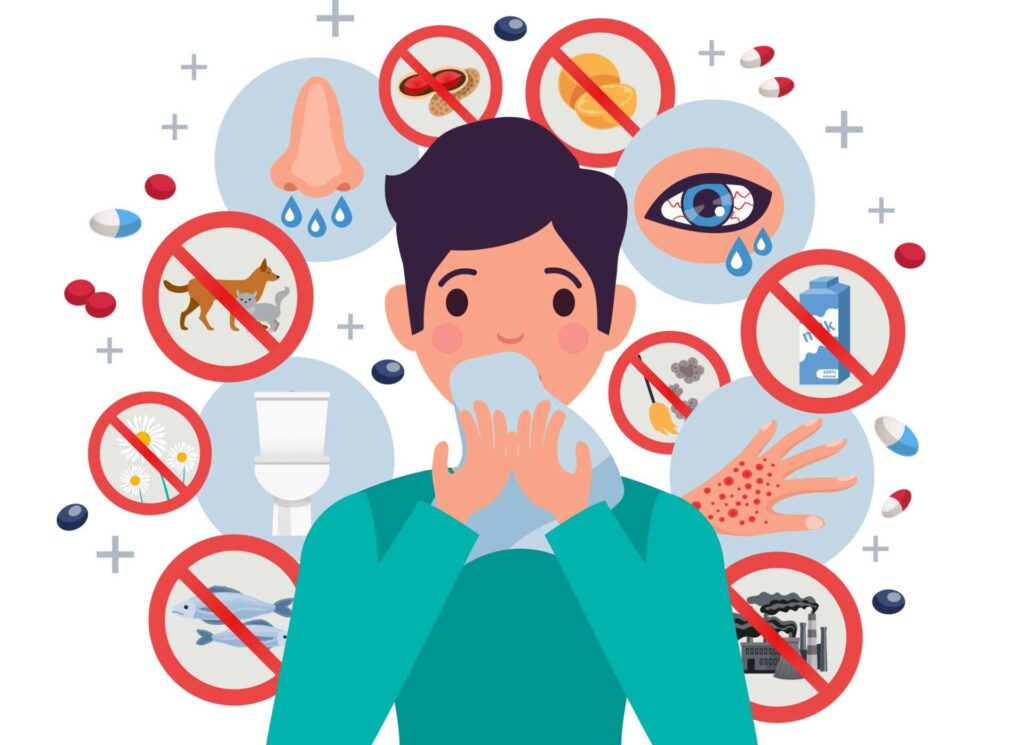GP Nord Ltd
Reg. Nr: 40203177406
Address: Kurzemes prospekts 23, Rīga, LV-1067, Latvija
Several types of medicines are used to treat allergy symptoms – tablets, liquids, inhalers, nasal sprays, eye drops, skin creams and injections. Some are available without a prescription; others are available by prescription only. Here is a summary of allergy medications and the reasons for using them.
Antihistamines
Antihistamines block histamine, a chemical that is released by the immune system during a test reaction.
Tablets and liquids
Oral antihistamines are available without a prescription and by prescription. They relieve runny nose, itchy or watery eyes, hives, swelling and other signs of an allergy or severe. As some of these medicines may cause drowsiness and tiredness, use them with caution when driving or performing other activities that require alertness.
Nasal sprays
Antihistamine nasal sprays help with sneezing, itching or runny nose, sinus congestion and drip after the nose. There may be a bitter taste, drowsiness or tiredness in the nasal spray of the antihistamine.
Eye drops
Antihistamine eye drops, available without a prescription or by prescription, can easily cause itchy, redness and swelling of the eyes. These drops may contain a combination of an antihistamine and other medicines. Side effects can be recurrent and dry eyes. If antihistamine drops cause eye irritation or burning, additional tear drops may be used.
 Decongestants
Decongestants
Decongestants are used for rapid, temporary reduction of nasal and paranasal congestion. They can cause sleep disturbances, regular, increased blood pressure and irritability. They are not recommended for people with high blood pressure, cardiovascular disease, glaucoma or hyperthyroidism.
Tablets and liquids
Oral decongestants reduce the blockage of the nose and sinuses caused by hay fever. Many decongestants, such as pseudoephedrine, are available without a prescription. Many oral allergy medications contain a decongestant and an antihistamine.
Nasal sprays and drops
Nasal congestion sprays and drops reduce nasal congestion if used for only a short time. Repeated use of this medicine for more than three consecutive days may lead to recurrence or worsening of the condition.
Corticosteroids
Corticosteroids alleviate the problem of allergies.
Nasal sprays
Corticosteroid sprays prevent and reduce clogging, sneezing and runny nose. Side effects can include true taste, nasal irritation and nosebleeds.
Inhalers
Inhaled corticosteroids are prescribed by your doctor and are often used every day to treat asthma caused or exacerbated by reactions to airborne allergens. Side effects are usually minor and may include mouth and throat irritation and mouth yeast infections. Some inhalers of corticosteroids with severe bronchodilators.
Eye drops
Corticosteroid eye drops are used to relieve persistent itching, red or watery eyes, and other interventions are not effective. The use of these drops is usually monitored by a doctor who specializes in treating eye diseases (ophthalmologist), as there is a risk of problems such as cataracts, glaucoma and infection.
Tablets and liquids
Oral corticosteroids are prescribed by a doctor and are used to treat the symptoms caused by all kinds of reactions. Prolonged use in children can cause cataracts, osteoporosis, muscle weakness, stomach ulcers, high blood sugar and growth retardation. Oral corticosteroids may also increase blood pressure.
Skin creams
Corticosteroid creams reduce bad skin reactions such as itching, redness or flaking. These creams are prescribed by a doctor who will determine if it is safe to use this medicine for more than a few weeks. Side effects may include discolouration and irritation of the skin. Prolonged use, especially heavy use of prescription corticosteroids, can cause thinning of the skin and hormone levels.
Fat cell stabilizers
Fat cell stabilizers block the release of chemicals in the immune system that stimulate the reaction. This medicine is usually safe, but it usually takes several days to get the full effect. They are usually used when antihistamines do not work or are not well tolerated.
Fat cell stabilizers are available as nasal spray and eye drops.
Leukotriene inhibitors
Leukotriene inhibitors are prescription drugs that block the chemicals that cause leukotrienes. These oral medicines reduce the signs of allergies and disturbing nasal congestion, runny nose and sneezing. In some people, leukotriene inhibitors can cause psychological serious problems such as anxiety, depression, strange dreams, sleep disturbances, and suicidal thoughts or behaviors.
 Allergen immunotherapy
Allergen immunotherapy
Immunotherapy is prescribed by a doctor and is carefully planned. Exposure to allergens, especially those that are difficult to avoid, such as pollen, dust mites and molds, is gradually increasing. The goal is to train the body’s immune system not to respond to these allergens. Immunotherapy can be used if other treatments are not effective or tolerable. It also helps reduce asthma symptoms in some patients.
Injections
Immunotherapy can be given as several injections, usually once or twice a week. The dose may be increased weekly or biweekly depending on the patient’s tolerability. Thereafter, injections of the maximum tolerated dose may be given every two to four weeks throughout the year.
Side effects may include injection site irritation and allergy symptoms such as sneezing, congestion or hives. In rare cases, allergic injections may cause anaphylaxis, a sudden life-threatening reaction causing swelling of the throat, difficulty breathing and other signs and symptoms.
Sublingual Immunotherapy (SLIT)
With this type of immunotherapy, you place the allergen-based tablet under your tongue and allow it to be absorbed. This treatment has been shown to reduce runny nose, blockage, eye irritation and other symptoms associated with hay fever. It also relieves asthma symptoms. One of SLIT’s medicines contains dust mites (Odactra). Several SLIT tablets contain pollen extracts of different types of meadow grass.
Biological medicines
Some biologics target a specific immune response and try to prevent it. This medicine is given as an injection. Side effects of biological medicines may include redness, itching or eye irritation and irritation at the injection site.
Emergency injections of epinephrine
Epinephrine injection is used to treat anaphylaxis, a sudden, life-threatening reaction. The medicine is given using a pre-filled syringe and a needle device (automatic injector). You may need to carry two automatic injectors if you are likely to have a severe allergic reaction to certain foods, such as peanuts, or if you are allergic to bee or wasp venom. Sometimes a second injection is needed. It is therefore important to call an ambulance or get immediate medical attention.
Your healthcare professional will teach you how to use the epinephrine automatic injector. It is important to choose the type prescribed by your doctor, as the injection method may vary slightly from brand to brand. Also, be sure to replace your emergency epinephrine before the expiration date.
Get advice from your doctor
Work with your doctor to choose the most effective anti-allergy medicine and to avoid the problems it causes. Even over-the-counter medications for allergies have side effects, and some allergy medications can cause problems when combined with other medications.
It is especially important to talk to your doctor about taking allergy medicines in the following cases:
– You are pregnant or breast-feeding.
– You have chronic health problems such as diabetes, glaucoma, osteoporosis or high blood pressure.
– You are taking other medicines, including herbal supplements.
– You are treating a child with an allergy. Children need different doses or different medicines than adults.
– You are treating allergies in the elderly. Some allergy medicines may cause confusion, urinary symptoms or other side effects in elderly patients.
– You are already taking an anti-allergy medicine that does not work. Take the medicine in the original bottle or package with you to the doctor.
Keep track of your symptoms when you take your medicine and how much you take. This will help your doctor find out what works best. You may need to try some medicines to find out which ones are most effective and which have the least side effects.



